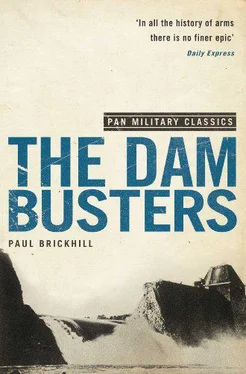Cochrane said: “Well, sir, I’ve known Walk’s for twenty-five years. He’s a wonderful engineer and I’ve never known him not to produce what he says he will.”
“I hope he does it again now,” Harris said. “You know how he works. I want you to organise the raid. Ask for anything you want, as long as it’s reasonable.”
Cochrane thought for a moment.
“It’s going to need some good aircrews,” he said. “I think I’d better screen one of my squadrons right away and start them on intensive training.”
“I don’t want to do that,” Harris said. “I don’t want to take a single squadron out of the line if I can help it, or interfere with any of the main force. What I have in mind is a new squadron, say, of experienced people who’re just finishing a tour. Some of the keen chaps won’t mind doing another trip. Can you find enough in your group?”
“Yes, sir.” Cochrane asked Harris if he wanted anyone in particular to command the new squadron, and Harris said:
“Yes, Gibson.”
Cochrane nodded in satisfaction, and ten minutes later, deep in thought, he was driving back to the old Victorian mansion outside Grantham that was 5 Group Headquarters. There could probably have been no better choice than Cochrane for planning the raid. A spare man with a lean face, his manner was crisp and decisive, perfectly reflecting his mind. The third son of a noble Scottish family, he was climbing to the top on his own ability; he had perhaps the most incisive brain in the R.A.F. His god was efficiency and he sought it uncompromisingly—almost ruthlessly according to some of his men, who were afraid of him, but his aircrews would do anything he asked, knowing that it would be meticulously planned.
Moreover, Cochrane knew Wallis well; had worked with him in the Royal Naval Air Service in World War I, flying his experimental airships and testing the world’s first airship mooring mast, which Wallis had designed. Ever since then Cochrane had had a quick sympathy for the scientific approach.
That night a nuggetty little man with a square, handsome face, named Guy Gibson, took off on the last trip of his third tour. If he got back he was due for leave and a rest, having been on ops almost constantly since the war started. The target was Stuttgart and his Lancaster was laden with one of the new 8,ooo-lb. “blockbusters” (not the penetrating “earthquake” type that Wallis envisaged, but bombs had made startling strides in the past year).
An engine failed on the way to Stuttgart and the aircraft would not hold her height. Gibson eased her out of the stream, dropping towards the ground, but headed on. The last trip of a tour is an ordeal with its hopes of a six-months’ reprieve. Before take-off the reprieve seems so near and yet so far, and waiting to get it over is not pleasant. Gibson took a chance rather than turn back and go through the waiting again.
Over Stuttgart he had the other three engines shaking the aircraft at full power and managed to drag up to a safe enough height to drop his bomb, then dived to the dark anonymity of earth and hugged the ground all the way back. That was Gibson’s 173rd trip. He was a wing commander with the D.S.O. and D.F.C. Aged twenty-five.
He woke late, head still ringing with the engine noise, and lay curled up, half thinking, half dreaming of leave in Cornwall. That morning his leave was cancelled and, to his dismay, he was posted to 5 Group Headquarters.
A day or so later he was shown into Cochrane’s office and saluted smartly.
“Ah, Gibson,” Cochrane said. “Firstly, my congratulations on the bar to your D.S.O.”
“Thank you, sir.”
“Would you like to do one more trip?”
Gibson gulped and said, a little warily:
“What kind of trip, sir?”
“An important one. I can’t tell you any more about it now except that you would command the operation.”
Gibson said slowly, “Yes, I—I think so, sir,” thinking of the flak and the fighters he hoped he had finished with for a time.
“Good; that’s fine. I’ll let you know more as soon as I can,” and a moment later Gibson was outside the door, wondering what it was all about. He waited two days before Cochrane sent for him again, and this time another man was with him, Group Captain Charles Whitworth, who commanded the bomber base at Scampton, a stocky, curly-haired man of about thirty, with a long list of operations behind him and a D.S.O. and D.F.C. on his tunic. Gibson knew him and liked him.
Cochrane was friendly. “Sit down,” he said and held out a cigarette. “I asked you the other day if you’d care to do another raid and you said you would, but I want to warn you that this will be no ordinary sortie and it can’t be done for at least two months.”
Gibson thought: “It’s the Tirpitz. Why did I say yes!” The 45,000-ton “unsinkable” battleship was lying in a Norwegian fiord, a permanent menace to the Russia convoys and a lethal target to tackle.
Cochrane was still talking. “Training for this raid is so important that the Commander-in-Chief wants a special squadron formed. I want you to form it. You’d better use Whitworth’s main base at Scampton. As far as aircrews are concerned, you’ll want good ones; you’d better pick them yourself. I’m telling all the squadrons they’ll have to give up some of their best crews. I’m afraid they won’t like it, so try and take men who are near the end of their tours. There’s a lot of urgency in this because you haven’t got very long and training is going to be very important. Go to it as fast as you can and try and get your aircraft flying in four days.”
“Well, er… what sort of training, sir?” Gibson asked. “And… what sort of target?”
“Low flying,” Cochrane said. “You’ve got to be able to low-fly at night till it’s second nature. No, I can’t tell you the target yet. That’s secret, but you’ve all got to be perfect at low flying. At night. It’s going to be the only way, and I think you can do it. You’re going to a place where it’d be wrong to send a single squadron at the normal height by itself.”
Gibson knew what that meant. Germany! A single squadron at 15,000 feet would get all the night fighters. It was not so bad for the main force, the stream of hundreds of bombers; they confused the enemy radar, dispersed the fighters, and there was protection in numbers. Not so with a lone squadron. But low level, “on the deck,” yes. Well, maybe! Well, it was going to be low level anyway. Over Germany! He knew a man named Martin who knew all about low flying over Germany. Gibson had met him when Martin was being decorated for it.
Outside the door Whitworth said, “See you at Scampton in a couple of days. I’ll get things fixed up for you. I imagine you’ll be having about seven hundred men.”
Somewhat bewildered, Gibson went off to the S.O.A. to see how one went about forming a new squadron. A staff officer helped him pick aircrew from the group lists. Gibson knew most of the pilots—he got the staff man to promise him Martin and help him pick the navigators, engineers, bomb aimers, wireless operators and gunners; when they had finished they had 147 names—twenty-one complete crews, seven to a crew. Gibson had his own crew; they were just finishing their tour too, but they all wanted to come with him.
The Staff Officer Personnel told him how many men of different trades he wanted for his ground crews and promised to siphon off picked men from other squadrons and post them to Scampton in forty-eight hours.
The equipment officer promised to deliver ten Lancasters to Scampton within two days. Just for a start. More would follow. With them would come the spare spark plugs and tools, starter motors and drip trays, bomb dollies and winches, dope and paint and chocks and thermos flasks. Gibson was startled by the unending list. Another man promised the thousand and one items for the men: blankets and lorries and bootlaces, beer and socks, toilet paper and so on. He was two days on these details, helped by Cochrane’s deputy, the S.A.S.O., Group Captain Harry Satterly, a big, smooth-faced man who was excellent at detail; and then it was all done— except for one thing.
Читать дальше












